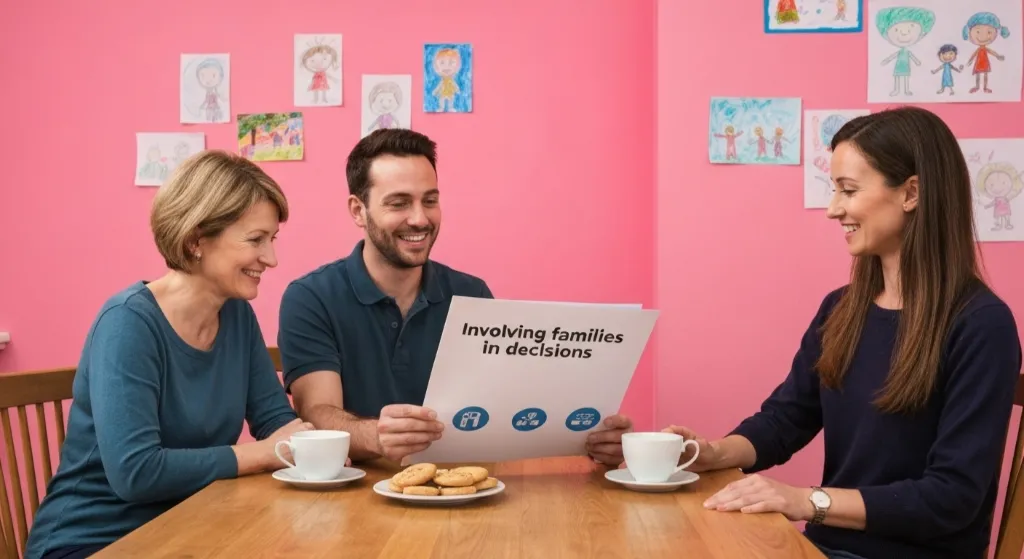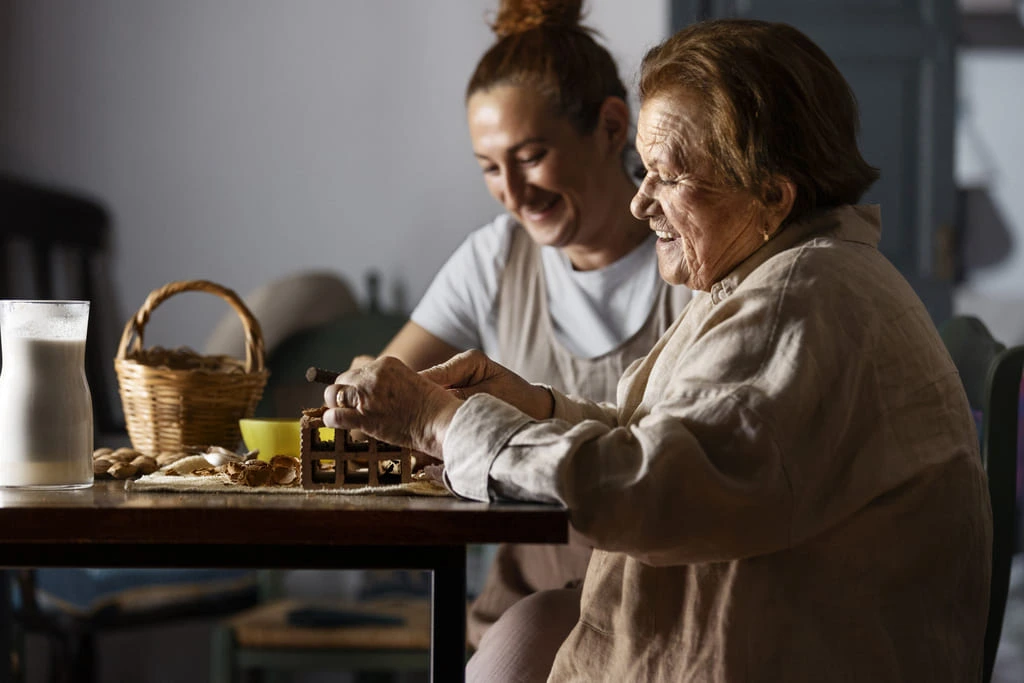What Is Person-Centred Care Planning?
Person-centred care planning is an approach to health and social care where the person receiving support is at the heart of all decisions about their care, reflecting the principle of person-centredness. Rather than professionals making plans for someone, the process is done with the person, recognising their individuality, strengths, preferences, and goals.
The proper person-centred planning encourages people to gain control and develop the confidence, skills and knowledge needed to make informed decisions about care plans and treatment options. The person-centred approach emphasises humanised ways of communication and building relationships based on trust, respect and dignity, which is integral to creating meaningful and effective care management systems.
In practice, for example, in a care at home or supported living setting, a person-centred care plan might:
- Identify meaningful activities, hobbies, or community participation that support their well-being.
- Detail how a person prefers their morning routine (wake-up time, meals, personal care).
- Include strategies for managing health conditions in ways that fit their lifestyle.
Who Should Be Involved in the Care Planning Process
Involving the right people ensures that plans are holistic, person-centred, and realistic while promoting shared responsibility and continuity of care. The key participants in the care planning process are:
- The person receiving support. Care plans should be primarily developed with them, not just for them. Their preferences, values, life goals, culture, and what matters to them are essential inputs.
- Family members, close friends, or informal carers. These are people close to the person who know them well. They often help with daily living, emotional support, and decision-making, and may help communicate preferences, especially if the person has difficulty doing so. Their involvement should be with the person’s consent.
- Advocate or representative. If the person lacks capacity or has difficulty understanding, expressing themselves, or participating, an independent advocate or appointed representative should be involved. Sometimes the person may nominate someone they trust.
- Health care professionals (general practitioners, nurses, therapy team specialists, mental health professionals, or social care professionals).
- Other agencies or support services (Long-term care providers, home care services, community organisations, or voluntary sector supports).
- The Local Authority / Coordinating Body

Person-centred planning means understanding the person’s needs and aspirations and coordinating support to meet those needs and goals. For this reason, developing a care plan should bring together everyone who plays a role in the person’s health, social life and well-being.
Additional Considerations:
- The person must consent to who is involved, unless legally someone else must decide (e.g. when capacity is lacking).
- If someone has sensory, linguistic, cognitive or communication difficulties, providing appropriate support (interpreters, sign language, speech and language therapy, accessible materials, etc.) is important so they can be fully involved.
- Plans shouldn’t be static. Everyone involved should understand their role in review, revision, and monitoring.
Key Elements of a Person-Centred Care Plan
The person-centred plan is a living document built around the person’s life story, preferences and aspirations. By focusing on what matters to the person, the plan guides everyone involved to deliver support in ways that respect the person’s safety and dignity. Person-centred plans share some common elements, each contributing to better outcomes and a more positive experience of care and support.
Personal Details
This section captures who the person is beyond their medical history and diagnosis. It ensures that everyone providing support knows the person, their hobbies, routines and preferences, not as a “service user”. It includes:
- Full name, date of birth, preferred name or pronouns.
- Cultural, religious or spiritual background.
- Communication preferences (language, format, sensory needs).
- Important relationships, family or friends who should be involved.
- Any legal representatives or advocacy arrangements.
Individual Goals
Goals anchor the care plan in what the person wants to achieve, not just what services provide. They may be short-term (daily routines) or long-term (lifestyle changes, new skills):
- Defined by the person with support from staff or family.
- Focus on meaningful outcomes (independence, participation, health, education, employment).
- Should be specific, measurable, and realistic, but flexible as needs change.
- Progress is reviewed regularly with the person.
Strengths and Abilities
Recognising strengths avoids a deficit-based view of care. It highlights what the person can do and enjoys, building confidence and engagement. The focus is on how these strengths can be used in achieving goals.
- Skills, talents and interests (hobbies, voluntary work, social roles).
- Coping strategies that the person already uses successfully.
- Personal qualities or motivations (resilience, creativity, sense of humour).
- Networks of support in the community or family.
Support Needs
The support needs section details the type, frequency and style of support that helps the person live well. It should be precise enough to guide staff but flexible enough to respect autonomy. Support needs include:
- Daily living tasks (personal care, meals, mobility, medication)
- Health care interventions or specialist therapies
- Environmental adjustments (lighting, sensory aids, accessibility)
- Risk management plans, including how the person prefers staff to respond
- Preferred times or routines for receiving support
Open Communication
Good communication underpins person-centred care. It ensures the person’s voice is heard and everyone involved shares information effectively:
- How the person best understands information (plain language, visuals, interpreters).
- How they express preferences (speech, sign, communication aids).
- Who should be updated about changes or decisions (family, advocates, professionals).
- Processes for regular reviews, feedback and complaints.
- Encouraging staff to listen actively, check understanding and respect confidentiality.
Person-Centred Care Values
Promoting the right values in person-centred planning that puts a person’s needs first means carrying the role in a humanised way that emphasises valuing and respecting the people you support. Being mindful and aware of the person-centred values that should be implemented in day-to-day care and support practices is essential in delivering care. The values in care planning can be expressed in the following way:
- Privacy
- Dignity
- Choice
- Understanding
- Human Rights
- Respect
- Compassion
- Individuality
- Independence
- Equality
- Diversity
The key elements of these values serve as a great example of how providing care can benefit well-being, health and a person’s freedoms.
Person-Centred Care Planning Process
The person-centred care planning process is an evolving approach that continually promotes a person’s active involvement in their care journey. It is related to the values that must be followed if carers intend to deliver an effective planning process. The first phase of creating and managing this process is for the carer to create a care plan that will be a shared document. The responsibility for the care plan should belong to the person receiving care, not the care providers.
It involves collaboratively developing a care plan that considers personal details and ensures reasonable adjustments are made to provide personalised care. This progressive process encourages people by actively involving them in making decisions and incorporating their life experiences, values, and aspirations. It promotes access to relevant information, enabling people to make informed choices and actively participate in their care.
Involving the Person in Decision-Making
Involving the person in shaping their own care and making the whole decision-making process, where possible, is a legal obligation. Several UK laws establish the right and duty to involve people in decisions about their care, such as:
- Mental Capacity Act 2005 – Sets a framework for assessing whether a person has the capacity to make a particular decision. If capacity is lacking, decisions can be made on their behalf, but the law requires that the person be involved as far as possible. It includes principles (like presuming capacity, providing support, considering “best interests”, using the least restrictive option) that ensure involvement even when someone may not fully decide independently.
- Care Act 2014 – Local authorities must involve the adult and any carers in preparing care and support plans. The adult has the right to ask for people to be involved, and if the adult lacks capacity to ask, “any person who appears … interested in the adult’s welfare” must be involved. Also, there is a duty to try to reach an agreement with the adult about how their needs will be met.
- Mental Health Act (1983, as amended) – Under this Act, people who are detained have rights related to their care and treatment plans. Reforms proposed in recent white papers (for example, the draft Mental Health Bill) seek to strengthen the patient’s involvement, e.g. advancing patient-rights to select a person to represent their interests, clearer care and treatment plans shaped by individual needs and preferences.
- Human Rights Act 1998 – The UK is bound to respect rights to private life etc. under the European Convention on Human Rights. Care decisions touch these rights, and public bodies must act compatibly with human rights, ensuring that people are involved in decisions affecting them where possible.
You may download any of the Acts or choose the one you need most. Each has been designed to provide a brief summary and the key details you require.
Progressive Language
Through the person-centred care planning, carers engage in ongoing dialogue with people to establish a comprehensive care plan encompassing various aspects of their well-being. This process embraces progressive language by emphasising the importance of actively listening to people and acknowledging their unique circumstances. It encourages health and social care providers to collaborate with those receiving care, considering their diverse backgrounds, identities, and preferences, to deliver respectful and person-centred care.
Communicating With a Person, not a Patient
This social model is a progressive shift in the realm of person-centred care. It recognises that people seeking treatment are not merely passive recipients but active participants in their care journey. Carers can establish a collaborative care plan by actively involving the person in the decision-making process and tailoring the plan to their unique needs.
This approach highlights the importance of communication and meaningful relationships between care providers and people themselves, ensuring their voice is heard and respected. It goes beyond traditional care practices by acknowledging the holistic nature of people’s lives and addressing their physical, emotional, and social care and support requirements. Service providers who embrace this approach prioritise the person’s overall well-being and quality of life, creating a more inclusive and compassionate healthcare environment.
Social care aspects, such as emotional support and community engagement, become integral components of the care journey. The approach emphasises collaborative partnerships between service providers and supported people, promoting mutual respect and trust. Care providers can better understand the person’s values, preferences, and goals through this approach, resulting in a more effective and holistic care and support experience.
Strength-Based Approach
Strength-based interventions focus on people’s strengths, interests, and potential, ensuring these elements are central to any strategy. By prioritising the person’s unique qualities, this approach empowers individuals of all ages, including young people, to actively promote and harness their own strengths, offering invaluable insights.
It also encourages service providers to develop a comprehensive understanding of the person as a whole, enabling the recognition and promotion of positive aspects that contribute to their well-being and mental health. The strength-based approach opens up a multitude of possibilities. It significantly impacts the person, underscoring positive outcomes and solution-focused therapy centred around their mental health. Moreover, it embodies a recovery-oriented and positive psychology-oriented approach.
Using Goals, Hobbies and Interests

Embracing the power of person-centred care, incorporating goals, hobbies, and interests has emerged as a progressive approach to fostering holistic well-being. A profound shift occurs by intertwining a person’s aspirations, passions, and pursuits into care, enabling providers to integrate life planning while tailoring the care plan with an unwavering focus on what truly matters to the person. This innovative paradigm embraces the notion that nurturing one’s goals, hobbies, and interests enables a sense of purpose and fulfilment and catalyses the path to recovery, promoting a more vibrant and meaningful life journey for each unique person.
Involvement in Community
Person-centred care planning goes beyond meeting basic health and social care needs. It also includes promoting participation in the community, social inclusion, and enhancing the overall quality of life. Community involvement allows people to pursue interests, build relationships, maintain independence, and contribute meaningfully to society. Integrating community involvement into care planning ensures that support is holistic and aligned with what matters most to the person.
Why Community Involvement Matters:
- Encourages social connections, reducing loneliness and isolation.
- Supports emotional and mental well-being.
- Builds confidence, life skills, and a sense of purpose.
- Provides opportunities for learning, work, volunteering, and leisure.
- Reinforces the person’s role as an active citizen rather than a passive care recipient.
Examples of Community Involvement in Care Plans
- Engaging in social enterprise projects or employment schemes.
- Joining local art classes, sports clubs, or dance groups.
- Attending community events, cultural or religious gatherings.
- Volunteering for local charities or environmental projects.
- Participating in peer support groups, advocacy forums, or local councils.
Adapting Care Plans Over Time
A person-centred care plan is a living document. As a person’s health, circumstances, preferences or goals change, the plan should be reviewed and updated to stay relevant. Regular reviews, often at set intervals or whenever a significant change occurs, ensure support remains appropriate and effective.
Key points:
- Ongoing reviews: Scheduled (e.g. annually) and whenever needs change.
- Feedback loop: Involve the person, family, and professionals in each review.
- Flexibility: Adjust goals, support methods, and community activities as required.
- Documentation: Record changes clearly so all staff provide consistent care.
What Is Included in a Person-Centred Care Plan?
A person-centred care plan is a document that guides care and support tailored to let’s say a young person’s needs, preferences, and goals. It focuses on the whole person, not just their condition.
Key elements include:
- Personal Details: Name, age, communication preferences, and meaningful relationships.
- Individual Goals: Short- and long-term aspirations meaningful to the person.
- Young Person’s Strengths and Abilities: Skills, talents, coping strategies, and personal qualities.
- Support Needs: Daily living support, health and social care, environmental adjustments, and risk management.
- Open Communication: How the person expresses choices, who is involved, and how information is shared. It is also essential to use clear, ordinary language instead of professional jargon.
- Community Involvement: Opportunities for social engagement, hobbies, volunteering, and participation in local life.
Essentially, it is a living plan that ensures the person is actively involved in decisions, promotes independence through a defined process, and supports a fulfilling life.
Benefits of Person-centred Planning
Person-centred planning puts the person at the heart of their care, focusing on their preferences, strengths, and goals. The main benefits include:
- Better Outcomes: Tailored support reduces risks, prevents crises, and promotes consistency in care.
- Empowerment and Choice: Supported people have control over decisions about their care and daily life.
- Improved Well-being: Plans consider emotional, social, and physical needs, enhancing overall quality of life.
- Stronger Relationships: Collaboration with family, friends, and professionals fosters trust and communication.
- Personal Growth and Independence: Encourages skill development, confidence, and participation in community life.

Get Person-centred Care with Leaf Complex Care
We at Leaf Complex Care embrace the transformative experience where holistic and person-centred care takes centre stage in our overall approach . Encouraging people to actively participate in their care journey, our support workers nurture a collaborative relationship with the people they serve, fostering a profound sense of empowerment, choice, and autonomy through person-centred approaches and practices.
Together, we co-create a future where personalised care transcends boundaries and revolutionises the way we prioritise people’s personal needs through consistent care plans.
With an ultimate focus on communication support, daily living skills and social skills, the person we support, Vladan, has made incredible progress in all areas of his development. In just 6 months after joining our care, the care teams have seen a huge improvement in his regulation, and within 1.5 years, his communication has improved massively. Read the whole case study here.
Contact us today. We deliver our services across the UK, with offices in Bristol, Somerset, the Midlands and the South East.
Reimagine care with Leaf Complex Care’s progressive person-centred model of care planning – your needs, your choices, your life!

